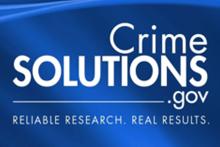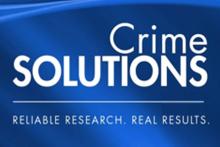Time Series
Racial Disparities in the Wake of Cannabis Legalization: Documenting Persistence and Change
Evaluation of a Healing-Centered Community-Wide Approach to Addressing Firearm Violence in New Orleans
California: A Decade of Decarceration
The Intersection of Gender, Race, and Arrest in the Era of Cannabis Legalization
Effect of Community-Based Interventions on High-Risk Drinking and Alcohol-Related Injuries
Looking Beyond the Sentence: Examining Policy Impacts on Racial Disparities in Federal Sentencing Across Stages and Groups, and Over Time
Quantifying the relationship between large public events and escort advertising behavior
Assessing Police Performance in Citizen Encounters: Police Legitimacy and Management Accountability
The Impact of Correctional CCTV Cameras on Infractions and Investigations: A Synthetic Control Approach to Evaluating Surveillance System Upgrades in a Minnesota Prison
Machine Learning Methods for Predicting Global and Local Crime in an Urban Area
Civil Citation: Diversion or Net Widening?
Effects of School Resource Officers on School Crime and Responses to School Crime
The Handbook of the Criminology of Terrorism
An Evaluation of Compstat's Effect on Crime: The Fort Worth Experience
The Application of the Skin Virome for Human Identification
Power grid frequency data conditioning using robust statistics and B-spline function
Time Series Forecasting (CrimeStat IV: A Spatial Statistics Program for the Analysis of Crime Incident Locations, Version 4.0)
The Effect of Marijuana Legalization on Jail Populations in Washington State
Multilevel Evaluation of Project Safe Neighborhoods
Project Safe Neighborhoods (PSN) is a DOJ-sponsored initiative to reduce violent crime, particularly gun crime, by fostering cooperation by criminal justice agencies and local partners to develop and implement strategic approaches.
See the YouTube Terms of Service and Google Privacy Policy
Collaborative Artificial Intelligence Platform for Bruise Age Analysis
Classification With the Matrix-Variate-t Distribution
The impact of recreational marijuana sales on calls for service: an analysis of neighbouring cities
Alternatives to Traditional School Discipline - Breakout Session, NIJ Virtual Conference on School Safety
On February 16-18, 2021, the National Institute of Justice hosted the Virtual Conference on School Safety: Bridging Research to Practice to Safeguard Our Schools. This video includes the following presentations:
See the YouTube Terms of Service and Google Privacy Policy
Terrorism Research Before and After 9/11
The tragedy of 9/11 posed unprecedented challenges to forensic science, social science, and physical science and technology — the three bedrock sciences at NIJ. Recovering from the attack and preventing another one have became topmost priorities in the 10 years since the attack. As we approach the 10th anniversary, Gary LaFree discusses how that fateful day impacted social scientific priorities and the outcomes from those changes.
See the YouTube Terms of Service and Google Privacy Policy




